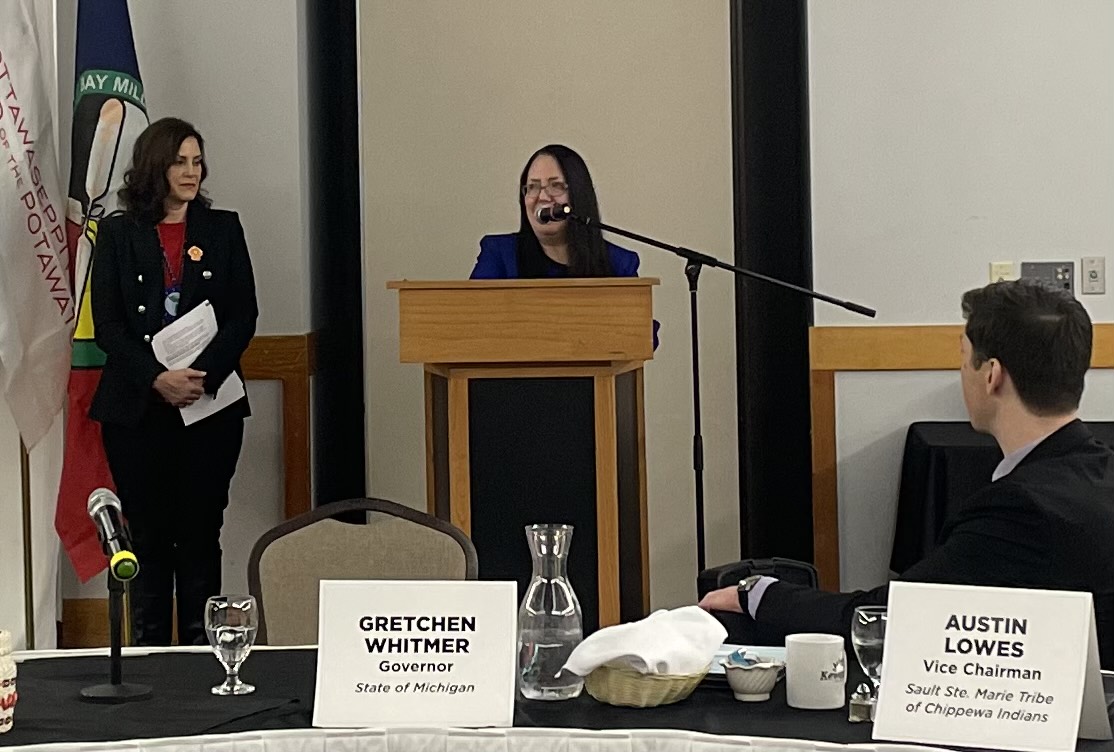
- Details
- By Native News Online Staff
Michigan Governor Gretchen Whitmer today announced the appointment of Judge Allie Greenleaf Maldonado to the Michigan Court of Appeals, making her the the first tribal citizen appointed to the court. Judge Maldonado currently serves as the Chief Judge of the Little Traverse Bay Bands (LTBB) of Odawa Indians Trial Court.
Judge Maldonado has also served as a pro tem judge for the Saginaw Chippewa Indian Tribe, the Little River Band of Ottawa Indians, and the Sault Ste. Marie Tribe of Chippewa Indians. Prior to her appointment as Chief Judge, she served as assistant general counsel for the LTBB tribe from 2002-2012.
Following her graduation from law school, Judge Maldonado was selected as only the 15th tribal citizen to enter the prestigious honors program at the United States Department of Justice (DOJ). There she became a litigator in the Indian Resources Section of the Environment and Natural Resources Division. She later worked as a staff attorney for Monteau & Peebles, LLP.
Maldonado earned her Juris Doctor degree from the University of Michigan Law School, and she holds a Bachelor of Science in Business from the City University of New York. Judge Maldonado is a nationally recognized expert on the Indian Child Welfare Act (ICWA) and the Michigan Indian Family Preservation Act (MIFPA). She is active in the legal community outside the courtroom and is a member of the Black Women Lawyer’s Association of Michigan, Anishinaabek Caucus of Michigan, Women Lawyer’s Association of Michigan, Michigan Committee on Juvenile Justice, and Michigan Justice for All Commission, and the treasurer for the National Association of Drug Court Professionals. Allie lives in Petoskey with her husband, Jay. She is a citizen of the Little Traverse Bay Bands of Odawa Indians and a member of the Turtle Clan.
“I am humbled and honored to be trusted by Governor Whitmer for this appointment to the Michigan Court of Appeals,” Judge Maldonado said in a statement. “I look forward to taking all of my professional experience and diligently applying it to the work ahead of me. This is a moment of importance not just for me but for all of Indian Country, as the Governor’s wisdom in this appointment sends a message about the critical importance of the work of tribal courts. I am grateful to the Governor and her team, and I look forward to giving all of Michigan my best.”
Want more Native News? Get the free daily newsletter today.
This appointment was made to fill a partial term following the retirement of Judge Amy Ronayne Krause, effective December 13, 2022. Judge Maldonado’s term will commence on January 9, 2023, and expire at twelve o’clock noon on January 1, 2025. If Judge Maldonado wishes to serve the remainder of Judge Krause’s term, expiring January 1, 2027, she would be required to run for reelection in November of 2024.
Judicial appointments are not subject to the advice and consent of the Senate.
More Stories Like This
Native News Weekly (August 25, 2024): D.C. BriefsUS Presidents in Their Own Words Concerning American Indians
NDAA passes House; Lumbee Fairness Act Advances
NFL, Vikings to Host Native All-American Game, Youth Flag Clinic
Senate Committee on Indian Affairs Passes 12 Bills to Strengthen Tribal Communities
Help us defend tribal sovereignty.
At Native News Online, our mission is rooted in telling the stories that strengthen sovereignty and uplift Indigenous voices — not just at year’s end, but every single day.
Because of your generosity last year, we were able to keep our reporters on the ground in tribal communities, at national gatherings and in the halls of Congress — covering the issues that matter most to Indian Country: sovereignty, culture, education, health and economic opportunity.
That support sustained us through a tough year in 2025. Now, as we look to the year ahead, we need your help right now to ensure warrior journalism remains strong — reporting that defends tribal sovereignty, amplifies Native truth, and holds power accountable.
 The stakes couldn't be higher. Your support keeps Native voices heard, Native stories told and Native sovereignty defended.
The stakes couldn't be higher. Your support keeps Native voices heard, Native stories told and Native sovereignty defended.
Stand with Warrior Journalism today.
Levi Rickert (Potawatomi), Editor & Publisher

